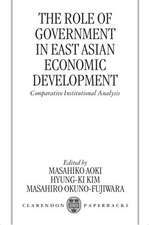Entrepreneurial Wage Dynamics in the Knowledge Economy
Autor Adam K. Korobowen Limba Engleză Paperback – 23 oct 2012
| Toate formatele și edițiile | Preț | Express |
|---|---|---|
| Paperback (1) | 379.48 lei 6-8 săpt. | |
| Springer Us – 23 oct 2012 | 379.48 lei 6-8 săpt. | |
| Hardback (1) | 576.52 lei 6-8 săpt. | |
| Springer – 30 sep 2002 | 576.52 lei 6-8 săpt. |
Preț: 379.48 lei
Nou
Puncte Express: 569
Preț estimativ în valută:
72.61€ • 75.82$ • 59.96£
72.61€ • 75.82$ • 59.96£
Carte tipărită la comandă
Livrare economică 15-29 aprilie
Preluare comenzi: 021 569.72.76
Specificații
ISBN-13: 9781461354048
ISBN-10: 1461354048
Pagini: 144
Ilustrații: XV, 125 p.
Dimensiuni: 160 x 240 x 8 mm
Greutate: 0.21 kg
Ediția:Softcover reprint of the original 1st ed. 2002
Editura: Springer Us
Colecția Springer
Locul publicării:New York, NY, United States
ISBN-10: 1461354048
Pagini: 144
Ilustrații: XV, 125 p.
Dimensiuni: 160 x 240 x 8 mm
Greutate: 0.21 kg
Ediția:Softcover reprint of the original 1st ed. 2002
Editura: Springer Us
Colecția Springer
Locul publicării:New York, NY, United States
Public țintă
ResearchCuprins
1 New Firms, Wages, and the Knowledge Economy.- 1. The Relationship Between Firm Size and Wages.- 2. Research Objective.- 2 Review of the Literature.- 1. Context of the Research.- 2. Documenting the Firm-Size Wage Differential.- 3. Worker, Industry, and Firm-Size Effects.- 4. Alternate Views of the Role of New Firms.- 5. Classifying Knowledge and Non-Knowledge Industries.- 6. Conclusions.- 3 Firm-Size, Wages, and the Role of Knowledge.- 1. Firm-Size and Wages in a Dynamic Context.- 2. Policy Perspective.- 3. Determinants of Wage Trajectories.- 4. Conclusions.- 4 Measurement: The Data Base.- 1. Overview of the Data Sets Used.- 2. Development of the Longitudinal Sector Cohorts.- 3. Measuring Knowledge.- 4. Cross-Sectional Descriptive Statistics for Wages and Employment.- 5. A Non-Parametric Analysis of New Firm Wage Trajectories.- 6. Employment, Growth, and Wage Dynamics.- 7. Conclusions.- 5 Measuring and Comparing the Wage Trajectories of New and Small Firms in Different Sectors: Does Knowledge Intensity Play a Role?.- 1. Introduction.- 2. Estimating Wage Trajectories.- 3. Selection.- 4. Wage Path Estimates.- 5. Comparing Wage Paths Across Firm Size and Sector.- 6. Knowledge Indicators and Wage Trajectories of New Firms.- 7. Specification of the Empirical Models.- 8. Empirical Results.- 9. Conclusions.- 6 Conclusions and Findings.- 1. Summary of Findings.- 2. Limitations of the Research.- 3. Implications and Future Research.- 4. A Final Perspective.- References.















